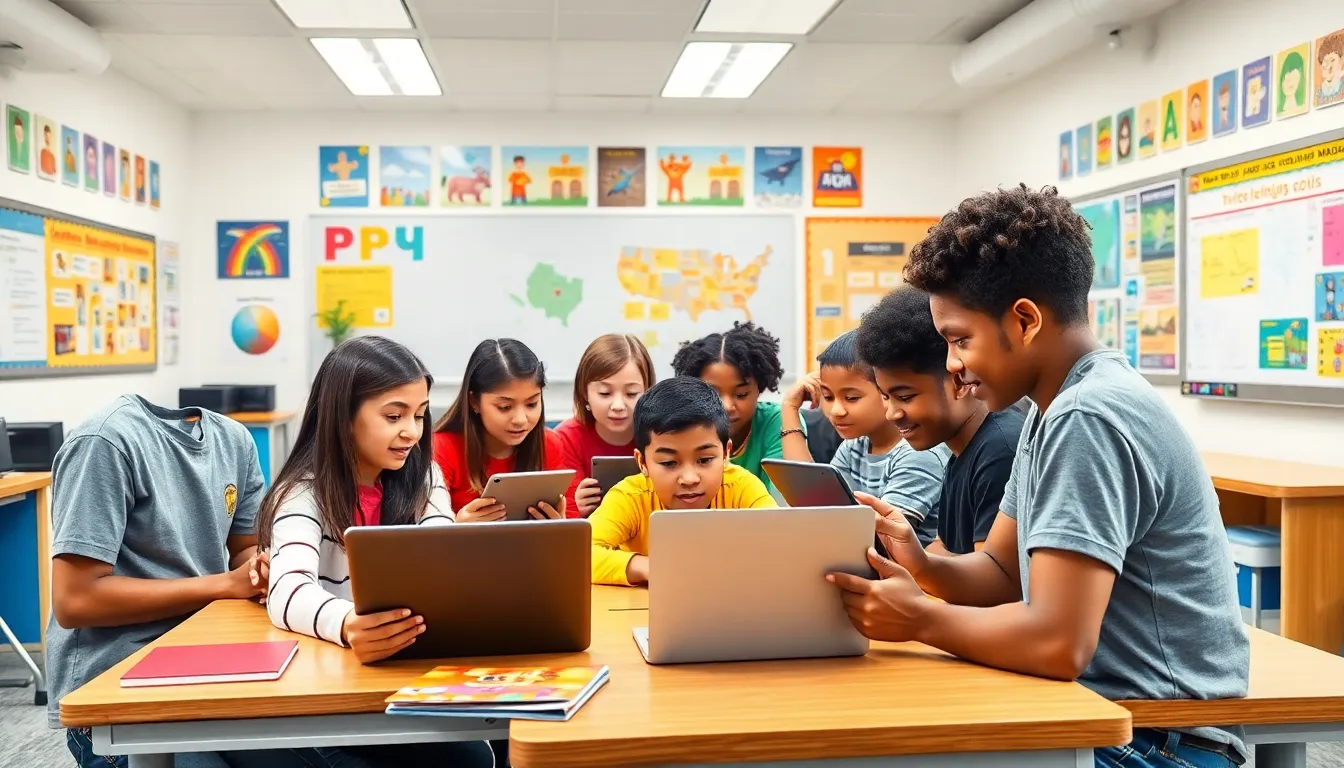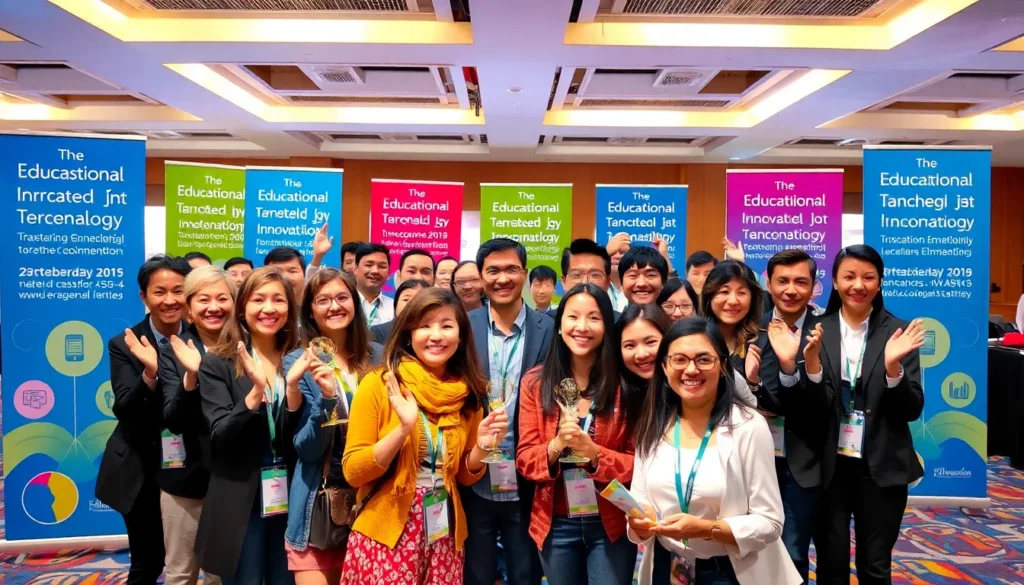In a world where smartphones are practically an extension of our hands, education is catching up with the tech-savvy crowd. Edtech innovations are transforming classrooms into dynamic learning hubs, making education as engaging as binge-watching a favorite series. Gone are the days of dusty chalkboards and tedious lectures; now, students are harnessing the power of interactive apps and virtual reality to dive into their studies.
Table of Contents
ToggleOverview Of EdTech Innovations
EdTech innovations redefine how educators and learners interact. With tools like learning management systems, teachers can provide personalized learning experiences. Mobile applications enhance accessibility, allowing students to learn anytime and anywhere.
Interactive software engages students, enabling real-time feedback during lessons. Technologies like gamification motivate learners by turning education into an engaging challenge. Virtual reality offers immersive scenarios that deepen understanding of complex subjects.
Data analytics plays a significant role in tailoring education. Educators utilize analytics to track student progress and adjust teaching methods accordingly. Artificial intelligence supports personalized learning pathways by adapting content to individual needs.
Online collaboration tools foster teamwork among students. These platforms enable group work beyond physical classrooms, preparing students for a global workforce. Adaptive learning technologies adjust difficulty levels based on student performance, ensuring mastery of concepts before moving forward.
Cloud-based resources simplify sharing educational materials. Teachers access a wide range of resources instantly, enhancing lesson quality. Digital textbooks provide updated content, reducing the burden of outdated materials.
Finally, cybersecurity innovations protect students’ data as learning shifts online. Safeguarding personal information becomes essential in a technology-driven educational landscape. Each of these innovations contributes to a dynamic learning environment, making education more relevant and effective.
Key Trends In EdTech

EdTech is evolving rapidly, influenced by several key trends that enhance educational experiences. These trends include the integration of artificial intelligence and the rise of gamification.
Artificial Intelligence In Education
Artificial intelligence transforms personalized learning in classrooms. It adapts educational content to individual student needs, allowing for tailored experiences. Through AI-driven platforms, educators receive insights into student performance, enabling them to adjust instructional strategies. AI chatbots provide instant support, answering student questions outside classroom hours. Educational institutions are implementing predictive analytics to identify at-risk students and offer timely interventions. This focus on individualized learning pathways enhances student engagement and outcome effectiveness.
Gamification And Personalized Learning
Gamification adds an engaging layer to education, motivating students through game-like elements. It includes leaderboards, badges, and rewards, captivating learners’ attention and encouraging participation. Personalized learning goes hand-in-hand with gamification, as it allows students to progress at their own pace. Adaptive learning platforms adjust challenges based on student performance, ensuring mastery of concepts. Teachers use gamified assessments to provide real-time feedback and create a sense of accomplishment. This combination promotes an interactive learning environment, capturing students’ interest and improving retention rates.
Impact On Teaching And Learning
Edtech innovations significantly transform teaching and learning. By integrating new technologies into classrooms, educators create dynamic environments that foster student engagement and support teaching efforts.
Enhancing Student Engagement
Innovative tools captivate students in ways traditional methods cannot. Interactive apps motivate learners through gamified elements, sparking interest in subjects. Virtual reality immerses students in complex scenarios, deepening understanding. Furthermore, real-time feedback enables instant adjustments, helping students grasp challenging material quickly. Engaging with digital content allows students to explore at their own pace, catering to diverse learning styles. The application of social learning platforms fosters collaboration among peers, enhancing the learning experience while building a sense of community.
Supporting Educators
Educators benefit from a variety of technological tools that streamline their teaching processes. Learning management systems enable personalized learning pathways, allowing teachers to tailor content to meet individual student needs. Data analytics assists in tracking student progress effectively, providing valuable insights for timely interventions. Cloud-based resources facilitate the sharing of teaching materials, promoting easier collaboration among educators. Innovations such as AI-driven chatbots offer instant support for students, freeing up educators to focus on instruction. Additionally, adaptive learning technologies adjust lesson difficulty, ensuring all students master the content, regardless of their starting point.
Challenges Facing EdTech Innovations
Despite the growing influence of edtech, several challenges hinder its full potential in reshaping education. Accessibility and equity along with data privacy concerns represent significant roadblocks.
Accessibility And Equity
Many students face barriers to accessing technology, exacerbating existing inequalities. Inadequate internet connectivity affects learning opportunities in rural and low-income areas. Devices like tablets and laptops aren’t available to all students, limiting engagement with digital resources. Inclusive design remains essential; products must cater to diverse learning needs. Schools that lack funding for edtech initiatives create disparities, affecting teachers’ ability to implement innovative solutions. Strategic partnerships with nonprofit organizations can help bridge the gap by providing devices to underserved populations. Effective policies addressing equity in education technology must prioritize wider access and resources for every learner.
Data Privacy Concerns
Data privacy poses significant challenges in the edtech landscape amid rising concerns over student safety. Schools collect vast amounts of personal information, increasing risks of data breaches. In many cases, inadequate data protection measures expose sensitive student information to cyber threats. Regulatory frameworks must evolve to safeguard student data and maintain trust between educators and families. Additionally, transparency from edtech companies regarding data usage is crucial for informed consent. Compliance with regulations like FERPA ensures protection, while fostering responsible data practices promotes secure learning environments. Educators must remain vigilant, educating students about privacy practices and encouraging responsible technology usage.
Future Of EdTech Innovations
Advancements in edtech point towards a future rich with possibilities. Personalized learning experiences are likely to expand, spearheaded by artificial intelligence. AI adapts educational content to suit individual student needs, providing insights into performance. This means that educators can more effectively support learners, identifying those who require additional help promptly.
Gamification continues to gain traction as a vital tool. Game-like features enhance student engagement and motivation through rewards and leaderboards. As a result, learning feels more like a fun challenge, which boosts retention and interest among students.
Virtual reality could redefine how complex topics are taught. Immersive scenarios allow students to explore and understand intricate concepts in real-world contexts. Students equipped with VR experiences often demonstrate deeper comprehension, engaging with material in ways traditional teaching cannot achieve.
Mobile applications will increasingly lend themselves to accessibility. Students can learn anytime and anywhere, making education more flexible than ever. This shift creates opportunities for those in remote areas to access quality resources and support.
Innovative tools will streamline educators’ workflows. With data analytics for tracking progress and cloud-based resources for sharing, teaching becomes more efficient. Technologies such as AI-driven chatbots enable instant support, allowing teachers to concentrate on instruction rather than administrative tasks.
However, it remains crucial to address challenges in accessibility and data privacy. Ensuring equitable access to technology requires ongoing efforts to provide resources in underserved communities. Protecting student data is paramount as schools collect vast amounts of personal information. Transparency from edtech companies regarding data usage is essential to build trust.
Future developments hinge on combining innovation with inclusivity, further enriching the educational landscape.
Edtech innovations are reshaping the educational landscape by creating engaging and interactive learning environments. These advancements not only enhance student engagement but also empower educators with tools that streamline teaching processes. As technology continues to evolve, the integration of artificial intelligence and gamification will play a crucial role in personalizing learning experiences.
However, addressing challenges such as accessibility and data privacy remains vital. Ensuring equitable access to technology for all students is essential for fostering an inclusive educational environment. By prioritizing innovation alongside inclusivity, the future of education can be both dynamic and equitable, paving the way for a more effective learning experience for everyone involved.






